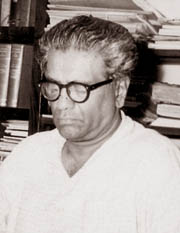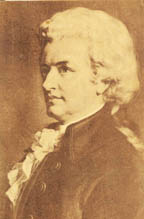
Dr Colvin R. De Silva: Brilliant lawyer and orator
Some of you may be harbouring ambitions of becoming lawyers some day.
Sri Lanka has produced some brilliant lawyers over the years, among whom
one of the best was Dr Colvin R. De Silva.
De Silva was not only an outstanding criminal lawyer, he was also one
of the finest orators in Asia, a historian, statesman, and an honest and
forthright politician. He was also the founder of the Lanka Sama Samaja
Party (LSSP), of which he was President for many years.

Colvin Reginald De Silva was born to the colonial middle class, the
son of an allopathic doctor. He was educated at the CMS missionary
school, Balapitiya, St. John's College, Panadura and Royal College,
Colombo, where he was a member of the boxing team.
After completing school, he continued his studies at the University
of London.
He came back from Britain a committed revolutionary, and took a room
at the YMCA Hostel, Fort where he started his law practice. He also led
Sri Lanka's first strike, which took place at the Wellawatte Mills.
At 27 years of age, De Silva married Suvineetha, the first woman to
pass the Cambridge Senior examination from his native town of Balapitiya.
During this time, he started representing in court, many people
wronged by the then colonial government. He also displayed outstanding
forensic skills; and was involved in some of the best-known criminal
cases in Sri Lanka.
The Marxist party, LSSP, was formed by him along with others such as
Dr N.M. Perera and Philip Gunawardena, on December 18, 1935. He started
promoting socialism and was arrested and jailed by the government. De
Silva was a father of four when he was jailed and saw his children only
five years later.
During the Second World War, while the Japanese air raid was under
way in Colombo on April 5, 1943, he escaped from prison and fled to
India, where he became closely involved with the Bolshevik Party of
India.
After the war, he came back to Ceylon and formed the Bolshevik
Samasamaja Party, through which he successfully contested the Wellawatte-Mt.
Lavinia constituency during Ceylon's first parliamentary elections of
1947. He lost this seat but later, regained it in 1956 as the LSSP
candidate.
De Silva opposed the 'Sinhala Only' policy, and during the debate on
the Official Languages Bill of 1956, backed his stand with the phrase
"one language, two nations; two languages, one nation".
He became the Minister of Plantation Industries and Constitutional
Affairs in the government of Sirimavo Bandaranaike and is credited with
the first Democratic Socialist Republic Constitution of Sri Lanka, which
established Sri Lanka as a Republic. In 1982, he unsuccessfully
contested the Presidential Elections too.
He won his PhD for the thesis 'Ceylon Under the British Occupation
1795-1833', which was released as a book in 1941. Another of his
publications was 'An Outline of the Permanent Revolution'. The
silver-tongued orator died on February 27, 1987.
Dr Colvin R. De Silva was a man with great vision, who could
instantly grasp the exact nature of any issue. Union Place, Colombo was
named after him, as a mark of honour to a man who made a vast
contribution to the progress of the society of the post-independence era
and the improved quality of life of the people in both towns and
countrysides.
Mozart: A great composer
If you are a classical music lover, you are sure to have heard of
Mozart. This musician was one of the giants of the classical music arena
and was responsible for some of the most outstanding pieces of music the
world has ever heard.

Wolfgang Amadeus Mozart was born on January 27, 1756 in Salzburg,
between Austria and Bavaria. His father, Leopold Mozart was also a
musician; his mother was Anna Maria Pertl. They had seven children, but
only Wolfgang and an elder sister, Maria Anna, survived.
The little boy was named Joannes Chrisostomos Wolfgang Gottlieb; all
these names meant 'Beloved of God'. His nearest and dearest knew him as
Wolfgangerly. It was only much later, after a trip to Italy, that he got
the name Amadeus.
When the young Mozart was about four years of age, his father started
concentrating on a music education for their daughter. When the young
boy also showed an interest in music, their father realised their
talents and abilities and started teaching them the intricacies of
music.
The two children started perfecting their talents and in 1761, three
days before his fifth birthday, Mozart mastered his first musical
composition. Before long, he was composing more complex pieces and the
proud father decided to take them on tour to the courts of Europe.
Their first trip was made to Munich in 1762, and then they set off
for Vienna. The boy gave his first public concert at Linz, and word soon
spread about the exceptional talent of the child musicians. Their
concert in Vienna was a massive success and invitations began pouring in
from all corners of Europe.
Due to the strains of constant performing may be, Mozart fell sick
with scarlet fever. Although he got better with the medications
administered by his father, periods of sickness became a regular feature
in his life.
During their trip to London, Leopold became sick and the children
were relieved of their performances for a while. During this period,
Mozart composed his first symphony for all instruments. They left London
and returned home only around 1765, but nine months later, were on the
road again.
Between 1774 and 1777, he was in Salzburg, working at the court of
the Prince-Archbishop. During this period, he composed many masses,
symphonies, operas, sacred works, concertos, serenades and dramatic
music. Although he earned well and regularly, sometimes he faced tough
times due to bad financial management.
He married Constanze Weber in 1782. The same year, he started working
on many piano concertos, and before the end of 1786, had produced 15
such works, which is considered as one of his greatest achievements. It
was also in 1786 that he wrote his famous operas, 'Le nozze di Figaro'
and 'Don Giovanni'.
He lived in Vienna for the rest of his life although he continued
travelling. His final works included the Clarinet Concerto.
Mozart died at the age of 35 in Vienna, on December 5, 1791. The
cause of death was a feverish illness.
Mozart left unfinished 'Requiem', his first large-scale work for the
church since the 'c Minor Mass' of 1783, which was also unfinished. |


